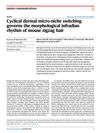 5 citations,
October 2018 in “Journal of Clinical Laboratory Analysis”
5 citations,
October 2018 in “Journal of Clinical Laboratory Analysis” Women with PCOS who have high male hormone levels often also have insulin resistance.
 September 2023 in “Fides et Ratio”
September 2023 in “Fides et Ratio” The safety and effectiveness of gender-affirming treatments for children are uncertain, with potential long-term risks like infertility.
 197 citations,
January 2019 in “Neuropsychopharmacology”
197 citations,
January 2019 in “Neuropsychopharmacology” Male and female bodies respond differently to stress, influenced by hormones and development stages, with implications for stress-related diseases.
 183 citations,
January 2018 in “Cosmetics”
183 citations,
January 2018 in “Cosmetics” Essential oils in cosmetics can offer benefits but may cause allergies and should be used carefully.
 November 2017 in “Elsevier eBooks”
November 2017 in “Elsevier eBooks” PCOS is a genetic disorder affecting women's reproductive health, with treatments focused on symptoms like insulin resistance and fertility.
 2 citations,
February 2023 in “BMC women's health”
2 citations,
February 2023 in “BMC women's health” Birth control pills change the activity of certain inflammation and blood clotting genes in women with PCOS.
 65 citations,
January 2011 in “Frontiers in Endocrinology”
65 citations,
January 2011 in “Frontiers in Endocrinology” Neurosteroids show promise for treating epilepsy and more research is needed.
 74 citations,
July 2010 in “The Journal of Clinical Endocrinology & Metabolism”
74 citations,
July 2010 in “The Journal of Clinical Endocrinology & Metabolism” Treatment of acromegaly can improve women's reproductive health issues caused by hormonal imbalances or tumors.
 November 2020 in “Elsevier eBooks”
November 2020 in “Elsevier eBooks” Antiandrogens and androgen inhibitors like spironolactone, finasteride, and dutasteride can treat hair loss and skin conditions, but they have risks and side effects, including potential harm to pregnant women and risks of cancer and heart issues. Herbal remedies also have antiandrogenic effects but lack safety validation.
 September 2002 in “Comprehensive Therapy”
September 2002 in “Comprehensive Therapy” Primary care is key in managing PCOS, focusing on lifestyle changes and medications like birth control and metformin.
 10 citations,
January 2015 in “Przeglad Menopauzalny”
10 citations,
January 2015 in “Przeglad Menopauzalny” Progestogens are essential in menopausal hormone therapy to prevent uterine cancer and must be chosen carefully based on individual needs.
 8 citations,
January 2020 in “Skin Pharmacology and Physiology”
8 citations,
January 2020 in “Skin Pharmacology and Physiology” Caffeine improves hair growth, thickness, and reduces shedding.
 1540 citations,
October 2008 in “Fertility and Sterility”
1540 citations,
October 2008 in “Fertility and Sterility” The report concludes that PCOS is mainly a condition of excess male hormones and its definition may change as new information is discovered.
 2 citations,
March 2001 in “Environmental Health Perspectives”
2 citations,
March 2001 in “Environmental Health Perspectives” Small hormonal imbalances can cause significant health problems, so more sensitive testing for hormone-disrupting chemicals is needed.
 August 2024 in “Indian Journal Of Clinical Practice”
August 2024 in “Indian Journal Of Clinical Practice” A balanced diet and healthy lifestyle help manage PCOS symptoms.
 151 citations,
December 2004 in “Annals of the New York Academy of Sciences”
151 citations,
December 2004 in “Annals of the New York Academy of Sciences” Congenital Adrenal Hyperplasia is a genetic disorder with two forms, causing symptoms like early puberty and severe acne, but can be identified through screening and treated with glucocorticoids.
 32 citations,
July 2001 in “Endocrine Practice”
32 citations,
July 2001 in “Endocrine Practice” Insulin-sensitizing drugs like metformin can help with ovulation, weight loss, and lower testosterone in some women with PCOS.
 124 citations,
June 2002 in “Best Practice & Research Clinical Endocrinology & Metabolism”
124 citations,
June 2002 in “Best Practice & Research Clinical Endocrinology & Metabolism” Polycystic Ovary Syndrome likely starts in childhood and may be genetic and influenced by early hormone exposure.
 5 citations,
December 2021 in “Scientific Reports”
5 citations,
December 2021 in “Scientific Reports” Age affects how certain proteins involved in COVID-19 infection are expressed in mice, but sex hormones and heart injury do not.
 30 citations,
March 2001 in “Environmental Health Perspectives”
30 citations,
March 2001 in “Environmental Health Perspectives” Small changes in hormones can significantly impact health, showing the importance of sensitive testing for chemicals that disrupt hormones.
 56 citations,
December 2011 in “Steroids”
56 citations,
December 2011 in “Steroids” The document suggests treating individuals with nonclassic congenital adrenal hyperplasia who show symptoms, especially those related to excess male hormones.
 1 citations,
April 2024 in “Sri Lanka Journal of Obstetrics and Gynaecology/Sri Lanka Journal Of Obstetrics and Gynaecology”
1 citations,
April 2024 in “Sri Lanka Journal of Obstetrics and Gynaecology/Sri Lanka Journal Of Obstetrics and Gynaecology” PCOS is a common hormonal disorder in women that can lead to serious health problems.
 January 2015 in “Springer eBooks”
January 2015 in “Springer eBooks” The document concludes that managing PCOS involves lifestyle changes, medication, and monitoring for associated health risks.
 19 citations,
January 2015 in “Indian Journal of Dermatology”
19 citations,
January 2015 in “Indian Journal of Dermatology” Skin changes in women with PCOS are mainly due to hormonal imbalances.
 20 citations,
October 2003 in “The Journal of Dermatology”
20 citations,
October 2003 in “The Journal of Dermatology” DCP therapy causes side effects like weakness, flushing, headaches, and taste changes, but less frequently causes hypertension and diabetes.
 4 citations,
August 2023 in “Nature Communications”
4 citations,
August 2023 in “Nature Communications” Mouse zigzag hair bends form due to a 3-day cycle of changes in hair progenitors and their environment.
 44 citations,
March 2008 in “European journal of endocrinology”
44 citations,
March 2008 in “European journal of endocrinology” Women with PCOS have lower ghrelin levels and a weaker response to sugar, which might affect their feeling of fullness and lead to overeating.
 46 citations,
December 2007 in “International Journal of Cardiology”
46 citations,
December 2007 in “International Journal of Cardiology” People with polycystic ovary syndrome may have a higher risk of heart problems due to abnormal nervous system control of their heart and blood pressure.
 1 citations,
January 2023 in “Mycopathologia”
1 citations,
January 2023 in “Mycopathologia” A woman's hair loss and scalp swelling, caused by a fungal infection, was wrongly treated but eventually cured with Terbinafine, emphasizing its effectiveness.
 16 citations,
March 2015 in “Clinical Cancer Research”
16 citations,
March 2015 in “Clinical Cancer Research” The document concludes that side effects from Smoothened inhibitor drugs for skin cancer are reversible and can be managed with a team approach to maintain quality of life.





























